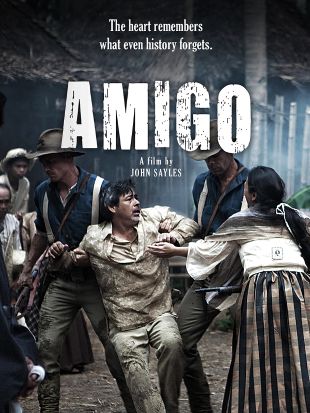
John Sayles is arguably America's most literate filmmaker. It's not just because he's an accomplished novelist as well as a director and screenwriter (though that helps), but because his films capture the richness of a good novel the way few others do. Sayles knows how to tell a compelling story, yet he does so in a way that engages both the mind and the heart, and while his work is never needlessly complicated, he doesn't believe in dumbing it down, either, allowing the complexities of his narratives to play themselves out in a satisfying fashion. Sayles' literacy extends to images as well as words, and his visual style is clean and bold, simple but engaging enough to move the action along just as well as his words. Along with his literacy, Sayles is one of America's few political filmmakers who can deal with the human costs of the decisions of our leaders as well as making sense of dogma (or revealing its nonsense), and he puts all of these strengths to good use in his 17th feature film, Amigo.
Amigo is set in 1900, as America, following its war on Spain, sets its sights on an important Spanish colony, the Philippines. Rafael (Joel Torre) is the mayor of a small village on the island of Luzon; he's a good man with a sense of justice and fairness, but also a pragmatist who knows that a politician occasionally has to do what's necessary rather than what's popular. The American war on the Philippines comes to Rafael's village one day, and he's forced to cooperate with Colonel Hardacre (Chris Cooper), an American officer who takes control of the village and puts Lt. Compton (Garret Dillahunt), a wary architect-turned-soldier, in charge of controlling the town and bringing "democracy" to its people. Practicality pushes Compton into an alliance with Padre Hidalgo (Yul Vázquez), an Augustinian friar who is trying to bring Catholicism to the village; the Padre is one of the only people in town who can speak Spanish and English, so he serves as interpreter, though his translations tend to favor his own views and agenda, and he's willing to play with both sides to favor himself. While Rafael has little choice but to cooperate with the Americans, he has mixed allegiances -- his brother, Simon (Ronnie Lazaro), is a leading member of a rebel army determined to gain Philippine independence, and Rafael's son fights alongside Simon. As the Americans are battling the insurgents while dominating the rank-and-file citizens, Rafael finds himself struggling with uneasy alliances as he and his people are beset on all sides.
Amigo is a film that serves two functions -- it's a historical drama that offers a look into the little-known Philippine-American War that raged from 1899 to 1902, but it also presents a number of clear analogies to America's contemporary war in Iraq. Like in Iraq, the war in Amigo finds America supposedly protecting people while treating them as political enemies, with the insurgents and the townspeople earning roughly the same disrespect from the soldiers, mostly poor boys from the South and West who don't know much about who they're fighting or why they're there. The officers are intent on bringing a bit of America to a foreign land without understanding the culture they've come to transform, or realizing that most of the folks there don't want or need to change. Torture takes the place of cooperation; people on both sides die for the wrong reasons; and the people who simply want to live in peace often pay the highest price.
While the metaphor is clear, Sayles has the intelligence not to force it, except for one sequence in which Rafael is subjected to something close to waterboarding. Sayles also paints the Philippine townspeople with a somewhat more nuanced palate than the Americans; however, the vast majority of the Yankee soldiers in the film aren't villains so much as confused, angry, and frightened boys tossed into a conflict that means little to them. The insurgents fare better only in that they're fighting for their home, though they also struggle with the commands of their leaders. (On a lighter note, the locals who enjoy their homebrewed booze and cockfighting during rare moments of peace prove that men will be boys wherever they go.)
As usual, Sayles has written an intelligent, fascinating script and brought it to the screen with the touch of a master. The pacing is gentle but moves with light insistence (Sayles also served as editor), and with the help of cinematographer Lee Briones-Meily he's given the film a look that's realistic yet also allows the natural beauty of the rural Philippines to show through. Sayles is a sure hand with actors, and he draws a commanding leading performance from Joel Torre as Rafael, a man trapped in a situation in which he knows he cannot win no matter how much his neighbors believe in him, while Garret Dillahunt gives Compton an admirable degree of shading and Chris Cooper is powerful and just villainous enough as Hardacre. This is a film about war and politics that is short on easy answers or satisfying compromises, but that's very much the point -- in both the Philippines and Iraq, no one who enters the battle walks away unscarred, and Sayles makes this painfully, compellingly clear in Amigo.
